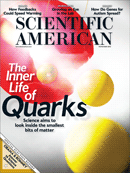
SCIENTIFIC AMERICAN
Scope & Guideline
Bridging Science and Society Since 1947
Introduction
Aims and Scopes
- Interdisciplinary Scientific Communication:
The journal emphasizes the importance of communicating complex scientific ideas in an accessible manner, bridging gaps between scientific communities and the general public. - Focus on Current Scientific Advances:
It regularly covers groundbreaking research and technological progress in fields such as astronomy, biology, environmental science, medicine, and technology. - Public Policy and Science:
Articles often explore the intersections of science with social issues, ethics, and public policy, encouraging informed discourse on pressing global challenges. - Innovative Research Methodologies:
The journal highlights innovative methodologies and technologies that are transforming scientific research, including AI applications, data analysis techniques, and experimental designs. - Environmental Awareness:
There is a consistent emphasis on environmental science, climate change, and sustainability, reflecting the urgent global need for ecological awareness and action.
Trending and Emerging
- Artificial Intelligence and Ethics:
There is a growing focus on the implications of AI in various fields, including healthcare, security, and ethics, reflecting the technology's rapid advancement and societal impact. - Climate Change and Sustainability:
The journal increasingly addresses climate-related issues, emphasizing research on sustainability, renewable energy, and ecological conservation, which are crucial in today's environmental context. - Health Innovations and Public Health:
Emerging themes include advancements in medical technology, public health strategies, and the implications of the COVID-19 pandemic on healthcare systems. - Neuroscience and Mental Health:
Articles exploring the complexities of the brain, mental health disorders, and the intersection of neuroscience with social behavior are on the rise, reflecting growing public interest. - Space Exploration and Astrobiology:
With renewed interest in space exploration, topics related to astrobiology, planetary science, and the search for extraterrestrial life are becoming more prevalent.
Declining or Waning
- Traditional Animal Research:
The journal has moved away from publishing articles focused solely on traditional animal research, reflecting a broader trend towards ethical considerations and alternative research methodologies. - Purely Theoretical Physics:
There appears to be a reduced emphasis on purely theoretical discussions in physics, possibly in favor of more applied science and technology that directly impacts society. - Historical Scientific Narratives:
While historical perspectives remain important, there has been a noticeable shift towards more contemporary issues and forward-looking scientific advancements. - Niche Scientific Topics:
Certain niche topics that once received more attention, such as specific subfields of chemistry or physics, are less frequently covered, possibly due to evolving interests and the journal's broader focus. - General Health Topics:
There is a decline in articles covering general health topics that do not directly relate to current health crises or innovative medical technologies.
Similar Journals
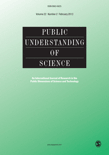
PUBLIC UNDERSTANDING OF SCIENCE
Illuminating the Intersection of Science and SocietyPUBLIC UNDERSTANDING OF SCIENCE, published by SAGE PUBLICATIONS LTD, stands as a crucial multidisciplinary journal dedicated to exploring the intricate relationship between science and society. With its well-established history from 1992 through to 2024, this journal offers an essential platform for researchers, professionals, and students interested in the communication of scientific knowledge and its impact on public perception. Recognized for its high academic standards, it proudly holds a Q1 ranking in the categories of Arts and Humanities, Communication, and Developmental and Educational Psychology, signifying its significant influence and contribution to these fields. The journal’s impressive percentile rankings further underscore its vital role in advancing scholarship, interaction, and understanding in the public discourse of science. Although it does not currently offer open access options, the journal is committed to disseminating scholarly research that informs and enriches the dialogue on critical scientific issues, making it a pivotal resource for anyone engaged in or studying the dynamics of science communication.

Chinese Science Bulletin-Chinese
Pioneering Knowledge Exchange in the Scientific CommunityChinese Science Bulletin-Chinese is a highly regarded multidisciplinary journal published by SCIENCE PRESS, focusing on advancing scientific knowledge across a variety of fields. With an ISSN of 0023-074X and an E-ISSN of 2095-9419, this journal has been in circulation since 1963 and has evolved through several converged years, thus showcasing a rich history of academic contributions. Currently categorized in the prestigious Q2 quartile in Multidisciplinary studies, it ranks #46 out of 171 journals in its category according to Scopus, reflecting its broad influence with a 73rd percentile ranking. While the journal does not offer open access, it remains a critical resource for researchers and professionals seeking to publish high-quality, peer-reviewed research. The journal's objective is to disseminate innovative findings and facilitate knowledge exchange among the scientific community, making it an essential tool for anyone interested in the latest developments in science, particularly within China.
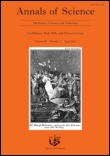
ANNALS OF SCIENCE
Charting the Course of Scientific Ideas Through TimeANNALS OF SCIENCE, published by Taylor & Francis Ltd, is a pivotal journal in the field of the History and Philosophy of Science, as evidenced by its Q3 categorization and a respectable Scopus rank of 99 out of 223, placing it in the 55th percentile among its peers. With a rich history dating back to its initial publication in 1936, the journal has made significant contributions to scholarly discourse, providing a platform for researchers and academics to explore the intricate connections between scientific developments and philosophical inquiries. The journal's commitment to rigorous academic research ensures that it remains a vital resource for professionals, educators, and students dedicated to understanding the evolution of scientific thought. Although it operates under traditional subscription models, the journal's importance in shaping modern scientific discussions cannot be overstated, making it an essential read for those engaged in the multifaceted study of science's history and philosophical implications.
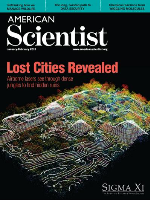
AMERICAN SCIENTIST
Cultivating Curiosity Through Accessible Science.AMERICAN SCIENTIST is a prestigious multidisciplinary journal published by SIGMA XI-SCI RES SOC, renowned for its commitment to disseminating high-quality scientific research and insights since its inception in 1946. With an ISSN of 0003-0996 and an E-ISSN of 1545-2786, this journal serves as a valuable resource for researchers, professionals, and students alike, seeking to engage with current scientific discussions across various disciplines. Though it is not an Open Access journal, its articles are well-regarded in the academic community, evidenced by its Scopus ranking, placing it in the top 80th percentile among 88 multidisciplinary journals. Covering a wide range of topics, AMERICAN SCIENTIST aims to bridge the gap between science and the public by providing accessible writing that encourages informed dialogue around scientific advancement. With its extensive historical range from 1946 to 2016, it continues to be a critical platform for the exchange of innovative ideas and research findings that shape the future of science.

CENTAURUS
Illuminating the Philosophical Dimensions of Scientific InquiryCENTAURUS is a prestigious journal dedicated to the History and Philosophy of Science, published by BREPOLS PUBL in the United States. With a storied history dating back to its inception in 1950, CENTAURUS has consistently provided a platform for critical engagement and scholarly discourse in the realm of scientific development and its philosophical implications. Recognized for its academic rigor, the journal holds a commendable Q2 ranking in the History and Philosophy of Science category for 2023, reflecting its substantial contribution to the field, as evidenced by its ranking in the top 11% of 223 journals in Scopus. Although it operates on a subscription-based model, the journal is a vital resource for researchers, professionals, and students seeking insightful analyses and discussions on the interplay between science and its philosophical dimensions. Published from Turnhout, Belgium, CENTAURUS continues to shape the landscape of scientific thought with its well-curated articles that examine over a decade's worth of scholarly contributions.

Spontaneous Generations-Journal for the History and Philosophy of Science
Fostering Dialogue on the Evolution of Scientific IdeasSpontaneous Generations: Journal for the History and Philosophy of Science is a dedicated publication focusing on the rich fields of history and philosophy within the scientific domain. Published by the Institute for the History and Philosophy of Science and Technology, this journal provides a vital platform for scholars, researchers, and students to explore and disseminate ideas that bridge the historical context and philosophical inquiries of scientific practices. With its commitment to open access, Spontaneous Generations ensures that groundbreaking research is widely available, fostering an environment of collaboration and knowledge sharing. Aiming to engage a diverse audience, this journal is pivotal for those looking to understand the evolution of scientific thought and its implications on contemporary issues, making it an essential resource in the academic community.

Metode Science Studies Journal
Exploring the Intersections of Knowledge and InquiryMetode Science Studies Journal, published by UNIV VALENCIA, BOTANICAL GARDEN UV, is an esteemed open-access journal dedicated to advancing scholarly discourse in the fields of history and philosophy of science and multidisciplinary studies. Since its inception in 2013, the journal has positioned itself as a vital resource for researchers, professionals, and students, fostering an environment for innovative research and cross-disciplinary dialogue. Based in the vibrant city of Valencia, Spain, this journal aims to publish high-quality articles that explore the intricate relationships between scientific practices and philosophical inquiries. With a current impact factor demonstrating its relevance in the academic community, the journal is indexed in Scopus, ranking in the 52nd percentile for history and philosophy of science and the 33rd percentile for multidisciplinary studies. Scholars can access a breadth of research outputs that span from 2015 to 2024, thereby contributing significantly to the intellectual landscape of the respective fields.

National Science Review
Driving collaboration across disciplines for impactful solutions.National Science Review, published by Oxford University Press, stands as a premier open-access journal dedicated to advancing the frontiers of multidisciplinary scientific research. With an impressive impact factor reflective of its high citation rates and a Q1 ranking within its category as of 2023, it ranks #5 out of 171 journals in its field, placing it in the 97th percentile of Scopus' multidisciplinary rankings. Since its inception in 2014, the journal has evolved into a pivotal platform for the dissemination of innovative findings across various scientific disciplines, attracting contributions from leading researchers globally. Accessible to both academics and professionals alike since its transition to open access in 2020, the journal not only promotes collaboration but also ensures the broad dissemination of knowledge critical for tackling pressing global challenges. Residing in the historic city of Oxford, United Kingdom, it continually seeks to contribute to the global conversation on scientific advancements and their implications for society, making it an indispensable resource for anyone at the intersection of science and innovation.

Revista Eureka sobre Ensenanza y Divulgacion de las Ciencias
Inspiring Dialogue and Discovery in Science TeachingRevista Eureka sobre Ensenanza y Divulgacion de las Ciencias is a premier open-access journal dedicated to advancing the fields of education and science communication. Published by the University of Cadiz in Spain, this journal has established itself as a vital platform since its inception in 2004. With an ISSN of 1697-011X, it aims to disseminate innovative research and pedagogical strategies that enhance the understanding and teaching of scientific disciplines. As of 2023, it holds a Q3 categorization in Education with a Scopus rank of #989/1543, reflecting its commitment to academic excellence and relevance. The journal's open-access model ensures that valuable research is readily available to educators and researchers worldwide, fostering a community engaged in the promotion of effective science education. With a focus on bridging theoretical and practical applications, Revista Eureka invites contributions that spark dialogue and inspire new methodologies in science teaching and dissemination.
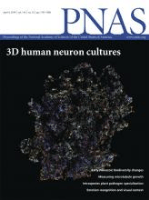
PROCEEDINGS OF THE NATIONAL ACADEMY OF SCIENCES OF THE UNITED STATES OF AMERICA
Championing Quality and Impact in SciencePROCEEDINGS OF THE NATIONAL ACADEMY OF SCIENCES OF THE UNITED STATES OF AMERICA (PNAS) is a premier multidisciplinary journal published by the National Academy of Sciences, dedicated to the publication of innovative research across a wide array of scientific disciplines. With an impressive impact factor and ranked within the top 5% of journals in its field (Scopus Rank #8/171), PNAS epitomizes excellence in scientific scholarship since its inception in 1945. The journal fosters the dissemination of groundbreaking scientific discoveries, offering vital insights and advancements that impact both academia and industry. Although it operates under a subscription model, PNAS remains a critical resource for researchers, professionals, and students striving for knowledge in various scientific domains. Its rigorous peer-review process and commitment to high-quality publications ensure that it continues to serve as an authoritative source of information and inspiration within the global scientific community.